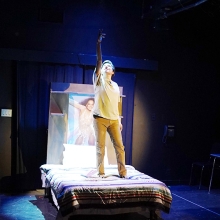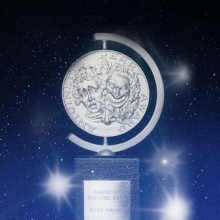Full Synopsis
Full Synopsis
Act One
At the opening, members of the company take the stage, each one wearing a label that identifes him or her as one of history's great philosophers: Socrates, Leonardo DaVinci, Frederic Nietzche and Jean Paul Sartre. They debate the existence of God ("Prologue"). Eventually, the debate disintegrates into babble, where ideas become only fragments and are being shouted over one another ("Tower of Babble"). They're silenced by John the Bapist, playing a shofar as he brings order and baptizes the company ("Prepare Ye"). John then gives a sermon to the audience, admonishing them.
Jesus enters and watches, bemused. He steps up to get baptized, and John falls to his knees, saying that he needs Jesus to baptize him. Jesus lifts him up and insists that John baptize him; he is here to save mankind ("Save the People"). From this point on, the actor playing John the Baptist becomes Judas. The company returns in bright, new costumes, and Jesus marks them, either with face paint or some kind of token, as being part of his tribe. They are separate from outside society. Jesus assures his followers that he has come not to abolish the law of the prophets, but to complete it. He informs them that those who keep to the law of God will earn the highest place in heaven. To illustrate this, he tells the story of the widow and the judge as company members act out the scene. The story shows that God is a good judge who will vindicate those who cry out to Him day and night.
They playfully move on to the story of the Pharisee and the tax gatherer praying in the temple to illustrate that every man who humbles himself before God shall be exalted, and the law of offering gifts at the altar before God is then explained by Jesus and acted out by the company.
To the accompaniment of their clapping in rhythm, the story of a Master and his servant who owed him debt is told next: The Servant, after asking for the Master's pity and being granted remittance from the debt owed to his Master, refuses to show pity on a fellow Servant who is in debt to him. Learning of the first Servant's reprehensible behavior, the Master condemns him to prison until the debt is paid. Jesus tells the company the moral of the story is that one must forgive as God forgives. One of the company members steps forward to be the first disciple to declare her loyalty to Jesus ("Day by Day").
Next, Jesus and the company enlist the audience to play Pictionary and other games to help teach more lessons. To narration and rhythm played by a company member, the others do a pantomime of the Good Samaritan story for Jesus, who then tells them to love their enemies and not to make a show of religion, much to the hilarious chagrin of the company. If good deeds are done in secret, the reward will come from God.
Now, the story of Lazarus and the rich man, with the help of an audience member. Lazarus is a poor man who goes to heaven, while a rich man goes to hell. The rich man begs God to let Lazarus rise from the dead in order to warn his rich brothers of their eventual fate. The warning is clear: one who does not follow God is doomed ("Learn Your Lessons Well"). Jesus tells the company that no one can be devoted to two masters and that no man can serve God and money. The story of a man who spends his life accumulating things, but dies before he can enjoy it, is entertainingly told by one of the company members while being performed by the others. The company member then takes the mic and blesses the Lord ("Oh, Bless the Lord My Soul").
Jesus bids the company to put away thoughts of material things and anxieties about tomorrow – like the lilies of the field. The company recites the first of the beatitudes, leaving each to be finished by Jesus in a call-and-response manner. However, when Judas exclaims his beatitude at Jesus, the company is shocked and unsettled. Jesus quickly changes the subject and, in vaudevillian style, assures everyone that, even if life is bad, their reward will be in heaven ("All for the Best").
After the song ends, the parable of the sower and the seeds, which represent the word of God, is told and performed ("All Good Gifts"). The company tells Jesus and the audience the story of the prodigal son. Having come together as a true community for the first time, the company addresses the audience, imploring them to live right and be a beacon for good in the world, as Jesus has just taught them to be ("Light of the World"). The audience is invited to join the company on stage for wine and jubilance before taking intermission.
Act Two
While one of the company members reminds the audience and other disciples what they have learned, the company sets up the stage for Act II ("Learn Your Lessons Well – Reprise"). The second act officially begins when a very sensual company member encourages both the audience and mankind to give up their foolish ways and turn to God. Jesus joins her entreaty ("Turn Back, O Man).
Jesus proclaims that all that has happened before – the forging of their community – has been preparation to embark on the mission of spreading the word that will eventually result in his demise.
Company members then portray the Pharisees who question Jesus' authority. Jesus challenges their questions with stories that display how wrong they are. Answering their final question, he tells them the greatest commandment is to love God with all of your heart and to love thy neighbor as thyself. Jesus scorns the Pharisees and calls them hypocrites. Some company members join in and throw garbage at the Pharisees ("Alas for You"). At the Wailing Wall in Jerusalem, Jesus predicts that he will not be seen again until a future time. He implores his followers not to be misled by the great many who will attempt to declare themselves his incarnation.
His preaching is interrupted as one of the female company members is thrown to the ground and pronounced guilty of adultery. The company means to stone her. Jesus tells them that the one who is faultless may cast the first stone. Ashamed, all relent. Jesus assures the woman that he will not condemn her, but that she must not sin again. As he is leaving, she asks Jesus to take her with him ("By My Side").
It is revealed that Judas has been paid thirty pieces of silver to betray Jesus. Listening intently, the company hears Jesus tell of a time when he will sit in glory. There, he will divide men into two groups, like sheep from the goats. With the help of the company Jesus explains that the righteous sheep, who always helped others and therefore helped God, will enter heaven. The cursed goats, however, who would do nothing for their fellow man and therefore nothing for God, will face eternal fire. The goats beg for mercy ("We Beseech Thee").
Jesus collects the special tokens given to the company at the start of the show, meaning that it is time for them reintegrate into society, bringing his teachings with them ("Beautiful City").
At the conclusion, the last supper has been set and Jesus joins his company, where he pronounces that one of them will betray him. When it's revealed to be Judas, Jesus tells him to do what he has to do quickly. Judas runs off. Jesus gives the company bread, explaining that it is his body. He does the same with wine, saying it is his blood. This, he says, will be the last time they eat and drink with him, until they are reunited in the kingdom of the Father.
Jesus bids farewell to each of the company members individually, sharing a brief moment with each. Judas reflects on what he is about to do ("On the Willows"). As he is praying alone in the garden, Jesus begs for the burden to be lifted from him. The company commands Jesus to prove that he is the son of God. He rejects the devil and accepts his fate.
Judas returns and kisses Jesus on the cheek. He then drags him to the fence upstage. There, Jesus is crucified. The company wails as Jesus dies. In a triumphant ending, the company removes Jesus from the fence and carries him offstage in a cortege ("Finale").




